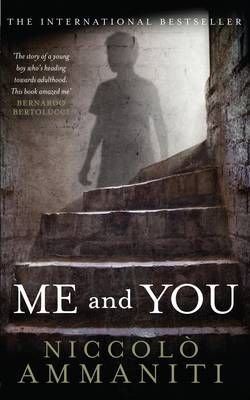Niccolò Ammaniti: Me and You
 Niccolò Ammaniti's novella makes me feel as if I was one of those musicians in Thomas Pynchon's short story, „Entropy” who try to make music in their heads – without score, without instruments, without any tools. There are very few tools (in this case: words) in this novella, and I feel abandoned by the writer. Sure, I could probably come up with a full, well-written story from what little there is in this book, and that book in my head could probably be very unsettling and dramatic and ultimately human (because I guess Me and You tries to be such a story), but then I might as well go ahead and invent everything, every single detail and episode and character. I guess I'd be better off that way because then it would be a story about characters who actually manage to interest me. Anyway, it doesn't really matter now since I already read the book – and it can be read pretty quickly, exactly because there's hardly anything in it.
Niccolò Ammaniti's novella makes me feel as if I was one of those musicians in Thomas Pynchon's short story, „Entropy” who try to make music in their heads – without score, without instruments, without any tools. There are very few tools (in this case: words) in this novella, and I feel abandoned by the writer. Sure, I could probably come up with a full, well-written story from what little there is in this book, and that book in my head could probably be very unsettling and dramatic and ultimately human (because I guess Me and You tries to be such a story), but then I might as well go ahead and invent everything, every single detail and episode and character. I guess I'd be better off that way because then it would be a story about characters who actually manage to interest me. Anyway, it doesn't really matter now since I already read the book – and it can be read pretty quickly, exactly because there's hardly anything in it.
Now, about the novella. Me and You is mostly about a brother and a sister. Lorenzo, a teenage boy, and Olivia, a girl in her early twenties both face serious problems in their lives. Lorenzo doesn't find his place among his peers at school, he always feels an outsider, and he doesn't have any friends to speak of. On the other hand, he seems to have an unhealthily close relationship with his mother (I write „seems to” deliberately – there are no facts in this novel at all, only the vaguest sort of hints, and nothing is ever clear about the characters and their relationships, so if I had been in a different mood, I could have interpreted the relationship between Lorenzo and his mum in about twelve different ways).
At the beginning of the story, Lorenzo is invited to join his classmates on their ski holiday, and his mother is delighted by the fact that the boy finally got some friends. But in fact, Lorenzo is not invited anywhere – he just wants some time alone, so when he's supposed to leave home on the first day of the holiday, he simply goes down to the basement of his family home, looking forward to a quiet week of reading and playing computer games. Then suddenly his half-sister, Olivia shows up from nowhere. She's a recovering drug addict, she's in the worst phase of withdrawal, and she needs a quiet place for herself. At first, Lorenzo has no idea what he's supposed to do in a situation like this, and he wishes to see the back of his sister as soon as possible, but then he slowly adapts to the situation and decides to help Olivia if he can.
Besides the story of the days they spend together in the basement, Ammaniti also writes a little about the protagonists' family backgrounds, and he throws in some hints to a couple of childhood traumas as well. From all this, I presume, we should get some kind of a picture of a highly dysfunctional, miserably screwed-up family where money serves as the substitute for real attention and concern for the children. And yes, I get it – but it's an awfully vague, unfinished picture. And the way the author depicts the relationship between Lorenzo and Olivia, and the supposedly wonderful way how they learn to love and respect each other is also vague and insubstantial. I can probably guess that their relationship should (seem to) be deep and honest, but two moderately fierce quarrels and one (1) tearful-dramatic conversation about the pains of the past is not nearly enough for me to be able to believe (or even: feel) this depth and honesty. (I often wonder while reading fiction: what makes something in a story believable and authentic? I honestly have no idea – but I'm assuming that it might help if the author actually writes a couple of details in his work.)
So my main problem with this novella is that Ammaniti is too meagre with his words – and this makes me sad because I happen to love words. But he tells very little, and he leaves a whole lot of gaps in the story I should fill in for myself. Generally I have no problem with this because – even though I like to have some things written down – I actually like it if there are gaps in a story and if I have to find my way around in it by following obscure hints. The problem here is that Ammaniti's protagonists are completely featureless and don't interest me at all – but how could they interest me if I don't get to know anything about them? And in the end I wonder: why should I even bother with trying to fill out the gaps in the story of a couple of colorless characters?





